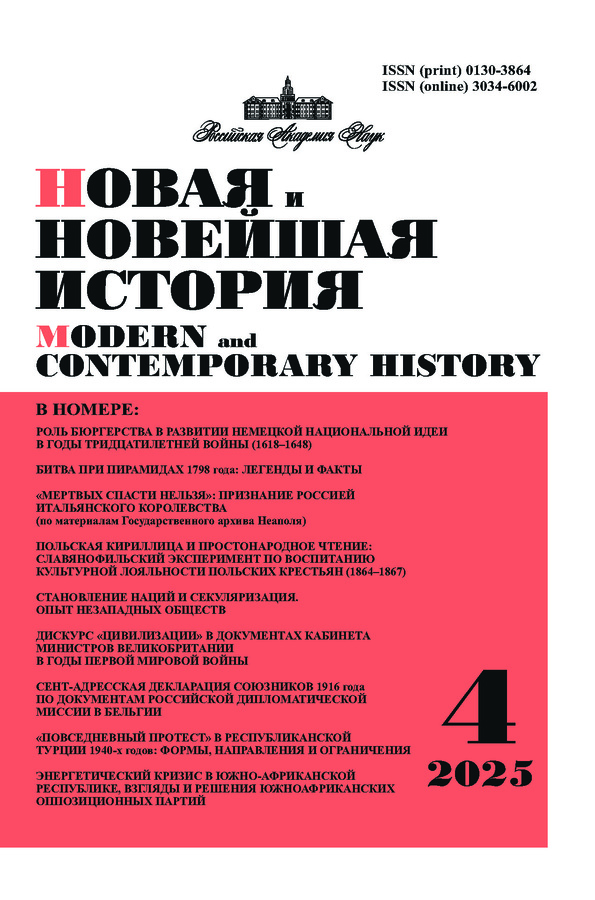“Everyday Protest” in Republican Turkey of the 1940s: Forms, Trajectories, and Constraints
- Authors: Shlykov P.V.1,2
-
Affiliations:
- Institute of Asian and African Studies, Lomonosov Moscow State University
- MGIMO University
- Issue: No 4 (2025)
- Pages: 158-174
- Section: 20th century
- URL: https://rjdentistry.com/0130-3864/article/view/691866
- DOI: https://doi.org/10.31857/S0130386425040119
- ID: 691866
Cite item
Abstract
This article examines the distinctive features of civil society in Turkey of the 1940s and analyses the modes and mechanisms of its interaction with the state in the context of wartime economic mobilisation. It contributes to the existing literature in two principal ways. First, it challenges the prevailing assumption of a weak, fragmented civil society under the firm control of a powerful state. This reframing invites a reconsideration of established interpretations of Turkey’s democratic transition during the 1940s and the interplay between internal dynamics and external influences shaping that process. Second, the study draws on a wide array of primary sources that have hitherto been rarely employed in the reconstruction of state-society relations in Republican Turkey. The article adopts a methodology based on detailed source analysis and comparison with previously established historical narratives. It demonstrates that, despite the absence of formal institutional channels, ordinary citizens retained the capacity to defend their interests and influence socio-political developments without resorting to overt, large-scale protest. Although the Kemalist state sought to project an image of strength and omnipresence, it ultimately proved susceptible to pressure from below. Neither the apparatus of coercion nor the establishment of a vast supervisory bureaucracy succeeded in enforcing the state’s ambitious plans for a wartime economy. On the contrary, diverse forms of everyday resistance hindered the implementation of government policy and compelled the authorities to introduce a substantive programme of social support by the mid-1940s.
Keywords
About the authors
P. V. Shlykov
Institute of Asian and African Studies, Lomonosov Moscow State University; MGIMO University
Email: shlykov@mail.ru
Moscow, Russia; Moscow, Russia
References
- Еремеев Д.Е. История Турецкой Республики с 1918 года до наших дней. М., 2017.
- Киреев Н.Г. История Турции. XX век. М., 2007.
- Шлыков П.В. Борьба с кемалистским государством: земельный вопрос и низовая гражданская активность в Турции в 1920–1930-е годы // Новая и новейшая история. 2024. № 3. С. 127–142. DOI: https://doi.org/10.31857/S0130386424030105
- Kireev N.G. Istoriya Turtsii XX vek [History of Turkey 20th century]. Moskva, 2007. (In Russ.)
- Shlykov P.V. Bor’ba s kemalistskim gosudarstvom: zemel’nyi vopros i nizovaia grazhdanskaia aktivnost’ v Turtsii v 1920–1930-ye gody [Contesting the Kemalist State: The Land Question and the Grass Root Civic Activity in the 1920–1930s Turkey] // Novaya i Novejshaya Istoriya [Modern and Contemporary History]. 2024. № 3. S. 127–142. doi: 10.31857/S0130386424030105 (In Russ.)
- Yeremeyev D.E. Istoriya Turetskoy Respubliki s 1918 goda do nashikh dney [History of the Turkish Republic from 1918 to the present day]. Moskva, 2017. (In Russ.)
- Yılda Çarkları Döndürenler. İstanbul, 1999.
- Abadan-Unat N. Kum Saatini İzlerken. İstanbul, 1998.
- Ahmad F. The making of modern Turkey. London, 1993.
- Alper Y. İşçilerle İlgili Sosyal Sigorta Mevzuatının Gelişimi: “Yap-Boz-Yap” Döngüsünden Çıkılabilir mi? // Sosyal Siyaset Konferansları Dergisi. 2022. № 83. S. 1–38.
- Barutçu F.A. Siyasi Anılar (1939–1954). İstanbul, 1977.
- Çatma E. Asker İşçiler. İstanbul, 1998.
- Çelik A. İkinci Dünya Savaşı’nda Hükümet-Basın İlişkileri ve Gazeteci Mebuslar // Fırat Üniversitesi Sosyal Bilimler Dergisi. 2018. Cilt 28. Sayı 2. S. 315–331.
- Ekin N. Memleketimizde İşçi Devri Mevzuunda Yapılan Araştırmalar ve Ortaya Koyduğu Neticeler // Sosyal Siyaset Konferansları Dergisi. 1960. Sayı 9-10-11. S. 123–192.
- Etingü T. Kömür Havzasında İlk Grev. İstanbul, 1976.
- Güvenir O.M. II. Dünya Savaşı’nda Türk Basını. İstanbul, 1991.
- Heper M. The State tradition in Turkey. Beverley, 1985.
- Keleş R. 100 Soruda Türkiye’de Şehirleşme, Konut ve Gecekondu. İstanbul, 1972.
- Keleş R. Türkiye de Şehirleşme Eğilimleri // AÜ SBF Dergisi. 1970. Cilt 25. Sayı 4. S. 41–83.
- Keyder Ç. Memâlik-i Osmaniye’den Avrupa Birliği’ne. İstanbul, 2013.
- Koçak C. Rejim Krizi. Türkiye’de İki Partili Siyâsî Sistemin Kuruluş Yılları (1945–1950). Cilt 3. İstanbul, 2013.
- Kösedağ M.S. Sıkıyönetim Dönemlerinde Türk Basını // Selçuk İletişim. 2019. Cilt 12. Sayı 1. S. 475–501.
- Makal A. Türkiye’de Tek Partili Dönemde Çalışma İlişkileri (1920–1946). Ankara, 1999.
- Maynard G.M. Letters from Turkey (1939–1946). Chicago, 1994.
- Metinsoy M. İkinci Dünya Savaşı’nda Türkiye. İstanbul, 2016.
- Osmanlı’dan Cumhuriyet Türkiye’sine İşçiler, 1839–1950 / eds D. Quataert, E. Zürcher. İstanbul, 2017.
- Öz E. Tek Parti Yönetimi ve Siyasal Katılım. Ankara, 1992.
- Scipio L.A. My Thirty Years in Turkey. Rindge, 1955.
- Scott J.C. Weapons of the Weak. New Haven, 2008.
- Şeref M. Türkiye ve Sosyalizm. İstanbul, 1968.
- Shlykov P. Non-western model of civil society in the Middle Eastern context // Russia in Global Affairs. 2021. Vol. 19. № 2. P. 137–140. doi: 10.31278/1810-6374-2021-19-2-134-162
- Sülker K. Savaş Yıllarında Bir Sürgün. İstanbul, 1986.
- Talas C. Sosyal Ekonomi. Ankara, 1972.
- Tesal R.D. Selânik’ten İstanbul’a. İstanbul, 1998.
- Tuna O. İş İstatistikleri // İÜ İktisat Fakültesi Mecmuası. 1945. Cilt 6. № 3–4. S. 221–231.
- Vehbi Koç Anlatıyor. Bir Derleme. İstanbul, 2018.
- Yalçın İ. Ölümün Ağzı. İstanbul, 2014.
- Yersel K. Madencilikte Bir Ömür. İstanbul, 1989.
- Zaim S. İstanbul Mensucat Sanayiinin Bünyesi ve Ücretler. İstanbul, 1956.
- Zürcher E.-J. Turkey. A Modern History. London, 2017.
Supplementary files










